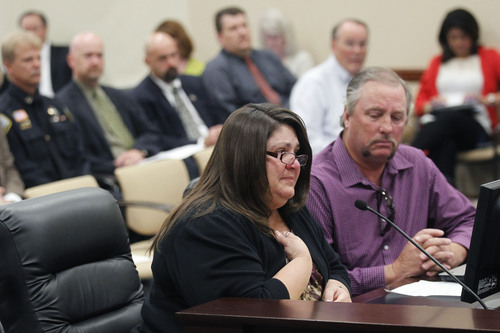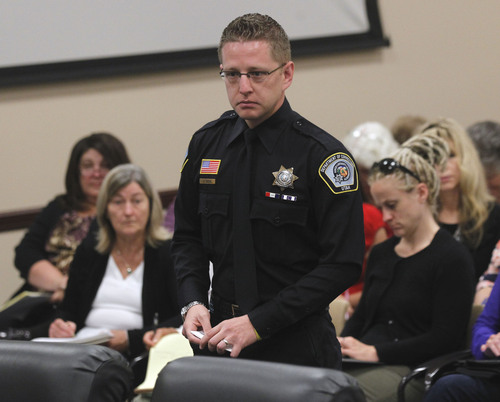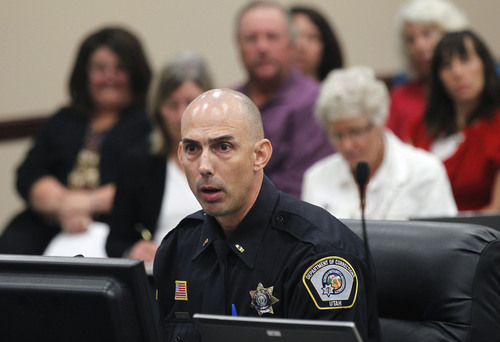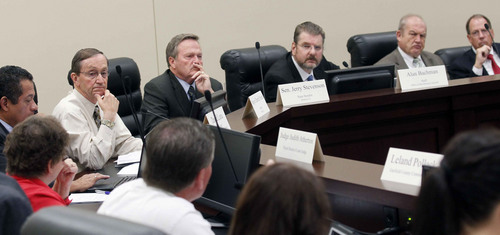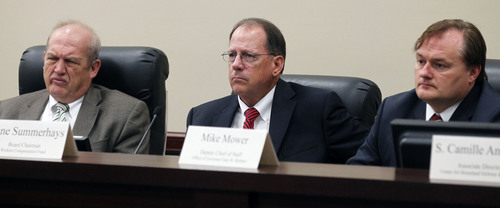This is an archived article that was published on sltrib.com in 2013, and information in the article may be outdated. It is provided only for personal research purposes and may not be reprinted.
Sy Snarr, whose son Zach was murdered 17 years ago while taking photographs of the moon at Little Dell Reservoir, said she gets some comfort when she drives by the Utah State Prison to know the killer is "in there, he's where he needs to be."
That visual reminder would be one of the things lost if the prison is moved from the Point of the Mountain, she told the Prison Relocation Authority Committee on Monday. And building a new prison in a more-remote location would be a hardship for victims who want to attend parole hearings. She said the older buildings at the site could be rebuilt and the money it would take to build a new prison — estimated in December at $550 million to $600 million — would be better spent on education.
"Inmates get three meals a day, a roof over their heads and better medical care than I do," Snarr said, "and we're paying for it."
Shauna Denos, whose son is incarcerated at Draper, said she, her husband, Robert, and other relatives have made 91 trips to the prison so far this year to visit him. It would be much harder to visit if the prison were located farther away, she said.
"Not everybody out there is a monster," she said. "They are kind and loving people who have made a mistake. ... There should be a responsibility to provide the opportunity for them to come out of their darkest hour a better person and a better member of our community. Please don't take that away."
The committee also heard Monday from representatives of corrections officers, the Fraternal Order of Police and the Utah Public Employees' Association, all of whom said building a new main prison complex far from the Wasatch Front would create hardships for workers.
Officer Justin Diehl, a staff member with the Draper Site Employee Council, said a decentralized option, with specialized facilities around the state, would interfere with the ability to work overtime, get promotions and supplement incomes through second jobs or working spouses. Employment opportunities off the Wasatch Front are likely to be far more limited, he said.
A prison move would cost employees money and cause additional stress and disruption as employees face relocating their families, added Lt. Dustin Hardcastle of the Fraternal Order of Police, which represents many correction officers. He said many would likely seek jobs elsewhere, causing a drain of experienced, senior employees.
Any new prison facility needs to be close enough to a "good pool" of people to draw not only employees but also volunteers who run programming, said Rollin Cook, director of the Utah Department of Corrections.
"It's a big concern," he said.
As it is, the uncertainty has resulted in "overwhelming turnover," which is being dealt with through mandatory overtime, Hardcastle said.
Capt. Kent Demill of the Utah Public Employees' Association said there are currently 100 "hard" staff vacancies and 135 operational staff jobs unfilled. All three officers spoke against privatization, which they said results in lower pay and benefits and puts staff and inmates at risk because of employees are typically less experienced.
The comments drew a defense from Draper Mayor Darrell Smith, who said the committee is "talking about making things better, not making things worse, for the entire state."
And Lane Summerhays, committee chairman, reassured the audience that no decision has been made on whether the prison would move.
"I would ask everybody to be patient as the process continues," he said, "and we figure out the right thing to do, where and when."
But the process will definitely be moving on a faster track.
Rep. Brad Wilson, R-Kaysville, took issue Monday with the slow approach taken so far by introducing his own draft of a request for bids — complete with a tight timetable — arguing that the bid documents would provide the most useful and best data to help the group decide what to do.
He said the need to quickly get concrete information before the committee was highlighted by descriptions of the "internal limbo" corrections employees are in because of discussions about moving the Draper facility.
"The clock is ticking," Wilson said as he shared an 11-page draft "request for proposals" document. "If we want to have anything to present to the Legislature in February, we can't vary too much from what's in this document."
Wilson's draft request document would allow bidders to provide proposals on part or all aspects of building a new prison, redeveloping the approximately 700 acres the Utah State Prison now occupies or a master plan for redevelopment of the area.
But the time frame spelled out in Wilson's draft document was derailed almost immediately. It called for an "opening date" for requests for proposals of Sept. 23 — a week before the group scheduled an open meeting to approve the bid solicitation.
A subcommittee that met after Monday's meeting to review the draft document also quickly decided it was uncomfortable discussing its parameters outside public scrutiny, Summerhays said. It set an open meeting for Friday at 2 p.m. to review and discuss what should be in the request for proposals.
The entire committee will meet again Sept. 30 — the same day most members will travel to Arizona to tour two prison facilities — to approve a final version of the document.
The group may be able to follow other deadlines in the document, which sets a deadline for submissions of Oct. 25. The committee would then evaluate bids, hold public hearings and decide whether to recommend one or more proposals by Jan. 10, 2014, followed by a written recommendation to Gov. Gary Herbert and the Legislative Management Committee. But several committee members said they are not inclined to rush a decision that would impact the state for decades.
The draft would bar bidders from keeping all or a large portion of a proposal confidential, which drew support from some committee members who advocated for a transparent process.
"The ultimate decision maker is the people of the state," said Sen. Stephen Urquhart, R-St. George. "They need a chance to influence us, influence the Legislature, and I don't feel comfortable making a decision on information they can't see."
Twitter: Brooke4Trib —
More pay for consultant, added meeting
The Prison Relocation Authority Committee agreed Monday to increase pay from $300,000 to $500,000 for a consultant to help it shape the bid request and evaluate proposals after receiving only two applications. It also will meet again Friday at 2 p.m. to review and discuss what should be in the request for proposals.


